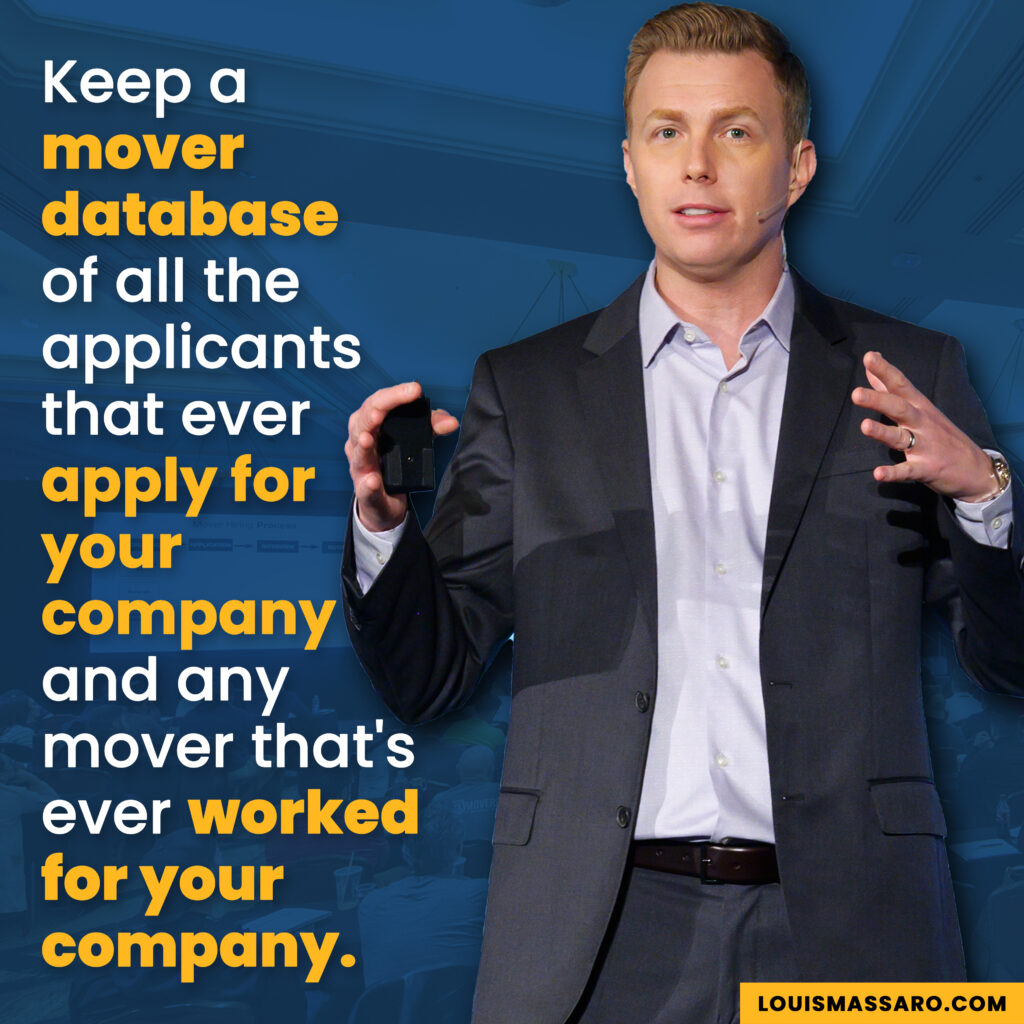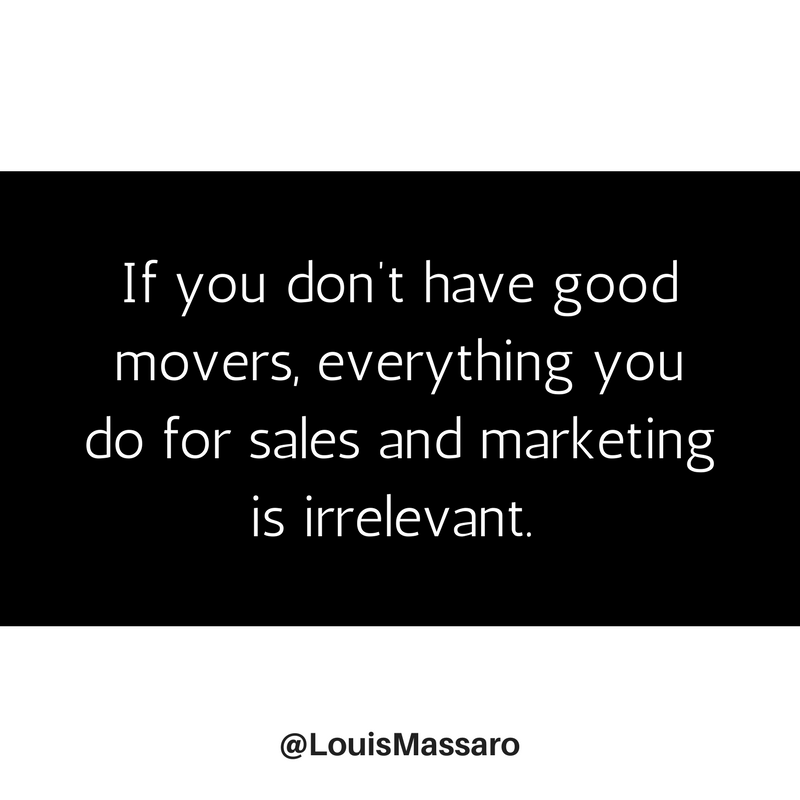SUMMARY
In this episode of The Moving Mastery Podcast, Louis Massaro shares what qualities and skills to look for when hiring movers.
- “When you are looking for movers, you have qualities and skills. Their individual qualities as a person, as an employee, and then you have their skills of moving furniture and things like that. It’s important as we go out and start to do our recruiting efforts that we have a criteria for what we’re looking for, and when you have this criteria, it’s going to basically allow you to just run them through a filter to make the whole process easy. They match the criteria or they don’t match the criteria, they move on to the next step in the hiring process.”
- “It all depends on what you’re looking for at the moment, so before you ever go to place an [employment] ad, you want to establish what your criteria is for what you’re looking for now so that you could sift through everything quickly. Movers don’t need all the skills of lumping, packing, padding, crating, etc. to be a good candidate for your team, because you can always train them on what they don’t know how to do. You might be looking for just drivers right now. You might be looking for just helpers or even helpers that don’t even have much experience, that can just lump furniture.”
- “You don’t just hire them, throw him a shirt and say, “Either go swim or sink.” You want to be able to coach them on the things that they need improvement with. Let’s say you establish that a particular set of movers are causing a certain type of damage. You want to be able to retrain them and coach them on that. Let’s say you’re getting some feedback from customers on the way that they’re handling certain things. You want to be able to coach them on that, to help them improve. But if they’re just not willing to listen and they know it all, it’s going to be really tough, unless they’re perfect and don’t make mistakes, for you to work with that individual.”
- “There are four types of applicants that are going to be coming in. Whoever’s doing your hiring, show them the Mover Applicant Quadrant. Give them this and say, “Look, this is what’s going to come in the door and I want you to establish what type they are so that we can make a decision moving forward and we don’t have to overanalyze each and every person and we don’t end up giving the wrong people an opportunity that’s going to come back and bite us.” We want to understand what our criteria is and the four types of movers that are going to be applying before we make any decisions on hiring.”
- Watch the video to get full training.
HOT NEWS & DEALS!
- Join the Moving CEO Challenge: Official Louis Massaro Community Facebook Group! A place for moving company owners to connect, share ideas, and inspire one another. Click here to join!
- Latest Instagram!
Check out @LouisMassaro for new announcements, valuable tips, and enlightening videos to take your moving company to the NEXT LEVEL!
RELATED POSTS
How to Hire Movers for Your Moving Company
5 Keys To Hiring Movers for Your Moving Company
Prepare Yourself for Moving Season



TRANSCRIPTION
Louis Massaro:
When you are looking for movers, you have qualities, right? Their individual qualities as a person, as an employee, and then you have their skills of moving furniture and things like that. So what are the qualities and the skills that we’re looking for because it’s important as we go out and start to do our recruiting efforts that we have a criteria, and when you have this criteria, it’s going to basically allow you to just run them through a filter to make the whole process easy, right? They match the criteria or they don’t match the criteria, they move on to the next step in the hiring process. Makes sense?
Let’s talk about the skills that movers have. Now, they don’t need all these skills, but it’s important that you identify the criteria and your criteria is different at different times. You might be looking for just drivers right now. You might be looking for just helpers and helpers that don’t even have much experience, that just can lump, right?
It depends on what you’re looking for at the moment so before you ever go to place an ad, which we’ll talk about, you want to establish what your criteria is for what you’re looking for now so that you could sift through everything quickly, all right? Lumping, just somebody that could just pick up stuff and move it and there’s nothing wrong with that because if you have a cooperative, helpful lumper with good qualities, which we’ll talk about in a minute, that listens, that’s coachable. You could put two of them with a well qualified driver, crew chief, and you’re good. Right?
Let’s just talk about, I’ll just run through all these different skills. Loading, right? Loading is something totally different. To be able to load a truck is a learned skill. It’s not something that someone just knows how to do naturally. To be able to come into a truck and identify the furniture that you have and come in and start to build out the base. If you have an attic, what to put in the attic. What you can’t stack on top of other things. What to do with the mirrors. What to do with the flat screen TVs, right? Do they put them in between mattresses? How are they strapping it? It’s a learned skill to load a truck, but you really only need one person on a job that’s skilled at loading a truck.
Packing. Packing dishes, packing china, packing stereo equipment, all kinds of packing. An additional skill.
Assembling, disassembly and reassembly, right? The ability to go in and disassemble a bed, reassemble a bed, take the mirror off the dresser, whatever it might be and inventorying, not really a word, but you get it. Inventorying, to be able to go in and do an inventory of the items. So whether it’s a long distance job or a storage job, you’re going to be doing an inventory of everything, right? So whether you’re doing it electronically or whether you’re doing it with a inventory sheet and the roll of stickers to where you’re stickering an item and writing down what it is, and then writing down the condition that it’s in. If it’s worn, if it’s scratched, all of that, that’s a skill and this is obviously stuff that you can teach, but you need to identify what your criteria is going into the hiring process.
Padding. Being able to pad a dresser. Being able to pad a chair. Estimating. If you’re doing any type of flat rate, if you’re doing any type of long distance move. If you’re doing anything that’s not, basically, like an hourly rate, then you need someone on that job that’s going to be able to go out there and estimate how long it’s going to take before they start the job. So let’s say you give somebody a, your inventory list, right? And it needs to be broken down by room for this exact purpose. You’ve done an inventory, whether it was an onsite estimate or whether it was over the phone, and your whole estimate is based off that inventory.
Well, you want someone that’s going to be able to go out there and, basically, walk around the house with your inventory, go to each room and say, “Yeah, this is about right. This is going to take us eight hours.” Otherwise you have no basis for revision. You want someone out there that’s your eyes and ears that could estimate the job.
Crating. Crating’s a whole nother skill. You could have your entire company with nobody that knows how to crate and outsource it every time, which is totally cool. But, it is another skill that if somebody comes to the table and they know how to crate, well, there’s an additional service that you could be charging extra for. So, if you don’t know what crating is, crating is basically taking very fragile items, let’s say a chandelier, and you basically build a whole box for the chandelier to where the chandelier is hanging at the top of the box and it’s boxed in, right? Or you’re crating glass. All done typically with wood. So it’s a very carpenter-type thing to do and we didn’t really have … occasionally we’d have somebody in a city that knew how to do it, or a long distance driver that was good. Otherwise we outsourced that to somebody else, but it is a skill.
Driving. Do they know how to drive the truck? Do they have a clean driving record? And communicating. Somebody, and it doesn’t always have to be the driver, has to be able to communicate with the customer, has to be able to go over the contract, go over the paperwork, collect payment, discuss where do they want things. Somebody needs to have good communication skills.
So these are the skills, and guys, let me know if I missed something, too, down below. If I missed any skills here. But these generally are the skills that we look for in a mover. Doesn’t mean that the people that you hire have to have these skills, we’ll get to that in a minute.
So now we want to look at qualities, right? As an individual, what qualities do they have? And these are really pretty simple, right? I mean, you don’t have too high of expectations, or at least I don’t, and maybe I’ve seen people that do have really, really high expectations, which could be making it much more challenging to find guys and keep them there consistently.
They need to be respectful, to you and the customer. Good hygiene, just good hygiene. You know, some people, I talked to somebody not too long ago says they need to be clean cut, no facial hair, and I can understand the logic there. However, facial hair is kind of like the new men’s, more than half the guys you see, it might even be more, have beards. So to say that your movers can’t have that, you’re just eliminated more possible, good recruits that you could have working for you.
Helpful. Simple. They just need to be helpful, again, to the company and to the customer. Cooperative, with the customer, with their other teammates on the truck, right? With dispatch. Cooperative.
They need to be a team player. They need to, there’s no way one guy could go out and do it all. He’s going to have to have at least one more person, if not two, three, four, five, six, whatever it might be. But typically between two and three per crew, they have to be a team player. They have to know how everyone on that crew is going to play their part to have a successful move for the customer and physically capable. I’m not even going to say strong, just physically capable to, they don’t have to put a dresser on their shoulder and walk down the street with it. Their, have another person to lift that with them. There are hump straps, right? They don’t need to be able to carry all the boxes. There’s dollies for that.
But they need to be physically capable to do their part of it. You don’t need big, jacked guys. You need physically capable, but that are mindful to not bang into walls. That are not dragging stuff on the floor. They’re just physically capable.
They’re reliable. They’re going to show up. I mean, that’s, it’s hard to know that in an interview, but that’s what you’re looking for and they’re coachable, right? The same way that you coach your sales team to improve, those of you and Moving Sales Academy like the process of enhancement training and, and taking them through that process of making them better. You do that with your movers, as well.
You don’t just hire them, throw him a shirt and say, “Either go swim or sink.” You want to be able to coach them on the things that they need improvement with and so, whether that’s … let’s say you establish that a particular set of movers or particular one mover is causing a certain type of damage. You want to be able to retrain them and coach them on that. Let’s say you’re getting some feedback from customers on the way that they’re handling certain things. You want to be able to coach them on that, to help them improve. But if they’re just not willing to listen and they know it all, you know, it’s going to be really tough, unless they’re perfect and don’t make mistakes, for you to work with that individual.
So now, these are the qualities that we’re looking for. We’ve got the skill set and we’ve got the qualities. All right? Let me know down below if there’s more qualities you’re looking for, I’d love to hear about it. Let’s get the discussion going.
But now, as we bring in applicants, this is the mover applicant quadrant. There’s four types of applicants that are going to be coming in and we’re going to talk about getting the applications and running through the whole process in a minute, but I’m just laying the groundwork here to simplify this, right? Because you know, sometimes we, and everybody’s guilty of it. We make things bigger and more complicated in our minds then they need to be and if we’re able to just take things and lay them out, and it’s just step, step, step. One foot in front of the other. If this, then that.
You guys hear me talk so much about process, process, process because when you have that, it takes all the mental trying to figure every little thing out every single day and you just, essentially, hit start on the process and run it step, step, step, step, step. We want to understand what our criteria is and the four types of movers that are going to be applying.
The first type is experienced. They’ve got the skills as a mover and they’ve got good qualities. You’re interviewing them. You determined that they have the skills. They know how to pack. They know how to load a truck. They know how to do it all and their qualities are great, right? They have a great personality. They’ve got good hygiene. They’re reliable. They’re respectful in the interview. That’s type one. We all know, everyone’s like, “Yeah, I want that.” That is, that’s the one you want.
Then you got type two. They are inexperienced, so they don’t have the skills of a mover. They’ve never loaded a truck. They’ve never packed a box. They’ve never padded anything, but they have good qualities as an individual. They’re reliable. They’re coachable. They’re eager to learn. That’s type two.
Then you’ve got type three. They’re experienced, but bad qualities and this is the trap that a lot of companies fall for because they put experience and skills over quality and personality and I say that as doing it myself for years. You get the resume in or application in and they’re like, “Oh, they worked here. They worked there. They worked here. They worked there.” All moving companies. You’re like, “Oh, jackpot.” Right? But just because they have experience at another moving company does not mean they’re a good fit for your business.
You probably have these guys right now, today, out on a job that you really would like to get rid of because they’re the know-it-all. I’ve worked for every major company. I’ve been doing this my whole life. But as an individual, as an employee, the qualities aren’t there.
Then you’ve got inexperienced, no skills. No skills. They don’t have the skills to be a mover, but they have good qualities. They are a good guy or a good person. Wow. This is great for the interview, but you’re like, “Hey, are you willing to learn?” We can train you because in the interview you want to basically, you don’t want to make somebody feel like they have to have the skills, because then they’re going to lie to you about having the skills and then when you put them to the test, they won’t, and then that kind of creates a uncomfortable situation. So you want to make them feel like it’s okay that they don’t have the skills because you’re willing to train them. But if they’re like, “Yeah, nah. This sounds like more work than I really want to put in.”
Okay, so now we’ve got our four types, all right? And you’ve probably guessed it already, but type one, you hire immediately. They come in. They’re an applicant. You do an interview. You establish they’re a type one, hire. Done.
Type two, hire and train. In other words, they’re not experienced with moving. So what? So what? You don’t need them to be a crew chief. You don’t need them to be the foreman. You need them to go out and we’ll talk about how to get them into the rotation, as well. But if they’re eager to learn, and they’re a great individual, they’re respectful. They’re coachable. They’re reliable. They have good hygiene. Hire them and train them.
Type three, they come in, add them to your mover database, okay? We’ll talk about that in a minute. But your mover database is basically a place where you’re going to keep all of the information of all the applicants that come in to where, when you’re in a pinch, when you’re in a situation where you need somebody and you might be willing to put up with the bad qualities, because you just need someone with experience for a busy weekend or for a certain job, that you could call on that person. But that’s not your first pick or second to come in for the company because we all know the bad qualities, that’s what causes more problems with customers than lack of skill. I’ve seen more problems caused by attitudes of movers, then even damage to the furniture.
Type four, keep looking. In other words, type four comes in, maybe you established it there. They’d be a great salesperson or something like that. Don’t force the situation. The idea is to keep the door, keep it revolving. Keep people coming in to where you don’t have to settle and you don’t try to have to force people into certain positions. But if they’re, have great qualities and you’re like, “Hey, I could use you in this other role.” Great. But otherwise, keep looking, all right?
So that’s your quadrant. Whoever’s doing your hiring, show them this. Give them this and say, “Look, this is what’s going to come in the door and I want you to establish what type they are so that we can make a decision moving forward and we don’t have to overanalyze each and every person and we don’t end up giving the wrong people an opportunity that’s going to come back and bite us.”
